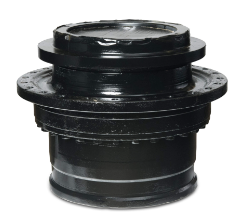Ultimate Showdown of Small Excavators (12-18 tonnes)
- RALPH COPE

- Mar 20, 2025
- 5 min read
Updated: Mar 29, 2025

When selecting an excavator in the 12 to 18-tonne category, understanding key differences in performance, efficiency, and operational capabilities is critical. This weight class provides versatile machinery suited for urban projects, construction sites, roadworks, and landscaping.
Here’s an in-depth look at four top excavator models in this class:
1. Caterpillar 315 GC
Operating Weight: 15.7 tonnes
Engine Power: 74.5 kW
Max Digging Depth: 5.54 meters
Tail Swing: Compact radius, ideal for tight spaces
The Caterpillar 315 GC balances power with fuel economy, making it a reliable choice for diverse job sites. Its compact tail swing allows for efficient operation even in restricted environments.
2. John Deere 135 P-Tier
Operating Weight: 17.0 tonnes
Engine Power: 75.3 kW
Max Digging Depth: 6.10 meters
Tail Swing: Reduced tail swing, enhancing versatility
John Deere's 135 P-Tier is known for advanced hydraulics and exceptional operator comfort, delivering excellent productivity across varied terrain and demanding conditions.
3. Hitachi ZX135US-6
Operating Weight: 14.3 tonnes
Engine Power: 74.9 kW
Max Digging Depth: 5.57 meters
Tail Swing: Ultra-short tail swing, optimized for confined job sites
Hitachi's ZX135US-6 excels in durability and efficiency, featuring robust build quality and a powerful, fuel-efficient engine designed for rigorous daily use.
4. Komatsu PC138US-11
Operating Weight: 14.8 tonnes
Engine Power: 72.6 kW
Max Digging Depth: 5.90 meters
Tail Swing: Short tail swing, designed for urban and congested sites
Komatsu’s PC138US-11 offers superior maneuverability and reduced tail swing without compromising on digging performance. It’s highly suitable for urban construction sites requiring precision and agility.
Which Excavator is Right for You?
Choosing the right excavator comes down to your project’s specific needs—whether prioritizing digging depth, power, agility, or operational cost-efficiency. Caterpillar and John Deere provide powerful performance balanced with economy and operator comfort. Hitachi offers extreme maneuverability and reliability, while Komatsu brings precision and efficiency to tight and complex work environments.
Small but Mighty: When a Small Excavator Is the Smarter Choice
Bigger isn’t always better—especially in the world of excavation. While medium-sized excavators (typically weighing between 10–20 tonnes) pack power and versatility, there are many situations where a small excavator (under 10 tonnes) outshines its larger cousins in both performance and practicality.
From urban construction sites to backyard landscaping, there’s a reason these compact machines are a favourite across multiple industries. In this blog, we explore the key scenarios where a small excavator is far better than a medium-sized one, and why smart contractors keep one in their fleet.
1. Tight Access and Confined Spaces
If your job site involves squeezing between buildings, maneuvering in backyards, or working inside warehouses, a small excavator is your best friend. With a narrower undercarriage, tighter swing radius, and compact design, small excavators can go where larger machines simply can’t.
Example:
Digging utility trenches in a narrow residential alley
Landscaping in tight suburban gardens
Demolishing interior floors in commercial buildings
Why small wins:You get access, precision, and zero damage to surrounding structures.
2. Lower Operating Costs
Fuel, transport, maintenance—it all adds up. Small excavators are significantly cheaper to run on a day-to-day basis.
Savings come from:
Lower fuel consumption
Fewer maintenance requirements
Simpler hydraulic systems
Reduced wear on components
Transport is also a breeze:Many small excavators can be towed on a trailer behind a 1-ton bakkie (pickup), eliminating the need for a low-bed truck.
3. Ideal for Utility and Service Work
Utility contractors who install water lines, electrical cables, or fiber optics love small excavators for their mobility and precision.
Why they’re perfect:
You don’t need brute force—you need surgical accuracy.
Smaller buckets mean less over-excavation.
Machines can hop between multiple residential or commercial jobs in a single day.
A medium excavator is overkill for these tasks—slow, cumbersome, and harder to position around existing infrastructure.
4. Reduced Ground Damage
If you’re working on lawns, pavements, or soft ground, the lighter footprint of a small excavator can save you from the headache of ground restoration.
Medium excavators:Can sink, rut, or damage the work surface.
Small excavators:
Cause minimal disturbance
Can be paired with rubber tracks to reduce scarring
Ideal for final-stage landscaping or touch-up work
5. Quick Deployment and High Mobility
Sometimes the job isn’t complex—it’s just urgent. Small excavators are often ready to go with minimal fuss.
Key advantages:
Fast start-up
Easy to load and unload
Perfect for emergency repairs (burst pipes, collapsed driveways)
With shorter cycle times, smaller machines can even beat medium excavators in productivity for light tasks.
6. Easier to Operate
Operators love small machines for their simplicity and responsiveness.
Great for:
Beginners or part-time operators
Training purposes
Sites where multiple staff members may need to jump on and off
A small excavator’s controls are often more intuitive, and the learning curve is gentler compared to the complex systems of medium or large machines.
7. Lower Insurance and Rental Costs
Insurance premiums are typically lower for small machines because:
They pose less risk of damage
They are cheaper to replace
They’re easier to secure on site
In the rental market, small excavators are far more affordable and often available on short-term rates with fewer delivery restrictions.
8. Perfect for Home and DIY Projects
Think tree stump removal, digging koi ponds, trenching for garden lighting, or prepping the ground for a swimming pool.
Small excavators are:
Affordable for weekend hire
Easy to operate by homeowners
Non-intimidating in residential settings
Medium excavators, by contrast, can look like overkill and frighten the neighbours.
9. Faster Return on Investment (ROI)
If you’re purchasing an excavator for your fleet, a small machine can pay itself off quicker.
Why?
Lower initial purchase price
Can handle frequent short-term jobs
Low downtime due to simple design
Ideal for plant hire companies with wide demand from plumbers, landscapers, and builders
You get fast turnover and high utilization.
10. Versatility with Attachments
Small doesn’t mean limited. Today’s small excavators can be fitted with:
Augers
Hydraulic hammers
Tilt buckets
Grapples
Trenchers
This makes them excellent multipurpose machines for tasks beyond digging. You can handle fencing, demolition, tree clearing, and drainage work without upsizing your equipment.
When a Medium Excavator Still Wins
To be fair, there are times when you’ll want the extra power:
Bulk earthmoving
Deep foundations
Heavy lifting
Breaking up hard rock
Large-scale demolition
But for everyday trenching, tight site operations, and light construction, small excavators have carved out a powerful niche.
Conclusion: Match the Machine to the Job
Choosing between a small and medium excavator isn’t about status—it’s about strategy. A small excavator may not have the brute strength of a 15-ton machine, but its agility, cost-effectiveness, and minimal footprint often make it the better tool.
If your work involves light digging, tight access, and frequent moves between jobs, a small excavator is not just a substitute—it’s the smart choice.
Looking to Add a Small Excavator to Your Fleet?
At Vikfin, we specialize in high-quality used and refurbished OEM parts for 20 and 30-ton excavators—but we also carry select small excavators and parts for leading brands like Kubota, Bobcat, Takeuchi, and CAT Mini. Whether you're repairing your machine or thinking about expanding your fleet to include a compact excavator, our expert team can advise you on the best options at unbeatable prices.
📞 Contact us today and let’s get your small machine back in action—or help you find the perfect addition for those tight jobs that need precision, not power.
#SmallExcavator #CompactExcavator #MiniExcavator #ConstructionTips #ExcavatorComparison #PlantHire #ContractorLife #UrbanConstruction #Trenching #UtilityWork #ExcavatorParts #Vikfin #UsedExcavator #ExcavatorRental #ExcavationTips #SiteAccess #GroundPreservation #ExcavatorFleet #CompactMachines #ExcavationMadeEasy








Comments